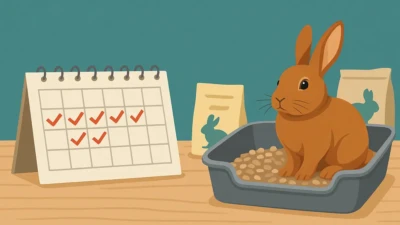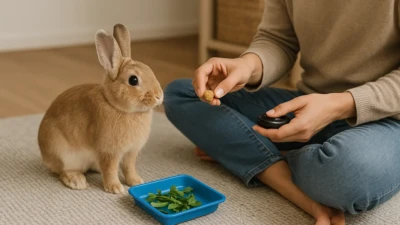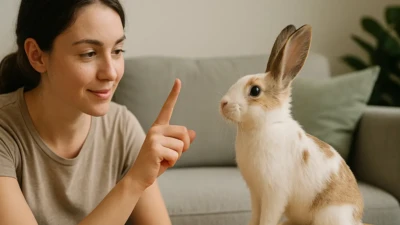Why Choosing the Right Rabbit Litter Box Contents Matters?
Rabbit owners often discover that the wrong bedding leads to wet feet, smelly rooms, and even costly vet visits. The right mix keeps odors low, prevents sore hocks, and encourages natural digging in a controlled place. This guide answers the exact question, “What to use in rabbit litter box?” while covering safe alternatives and an easy DIY build.
What Kind of Litter Box Is Safe for Bunnies?
Before filling the box, your container itself must protect delicate rabbit paws. High walls prevent scattering, but the entrance must sit low so joints stay stress-free as they hop in.
- Plastic cat litter pans with modified sides: Cut a 6-inch notch so even senior rabbits can step in easily. Rounded edges keep nails from catching.
- Corner boxes for small cages: Triangular pans clip to cage walls and save space, ideal for dwarf breeds weighing under 4 lbs.
- DIY shoe-box style: A long, shallow under-bed storage bin gives digging room without tipping over.
Quick Size Check
| Rabbit Weight | Recommend Pan Base (inches) | Wall Height (inches) |
|---|---|---|
| 2 – 5 lbs | 16 x 12 | 4-5 |
| 6 – 9 lbs | 22 x 15 | 6 |
| 10 lbs + | 26 x 17 | 7-8 |
What to Use in Rabbit Litter Box? Safe Vs. Toxic Materials
Below is a vet-approved list that balances absorbency, odor control, and bunny safety.
Top-Safe Litters
- Paper-based pellets (recycled newspaper): Ultra-absorbent, dust-free, and compostable within weeks.
- Aspen wood shavings: Natural scent without aromatic oils found in pine or cedar; great price point.
- Shelled buckwheat hulls: Light, renewable, and provide natural drainage to keep feet dry.
Never-Use Materials
- Clumping clay cat litter – expands when wet, deadly if ingested.
- Cedar or pine shavings – phenols stress liver and respiratory tract.
- Straw bleached with chemicals – high dust and little absorption.
Make a Rabbit Litter Box in 5 Simple Steps
Building a custom tray saves money and tailors fit to any hutch. Gather a storage bin, cutter, sandpaper, and 30 minutes.
- Mark the doorway: Draw a U-shape 5-6 inches tall on one short side, centered and level.
- Cut smoothly: Use a box cutter; score twice for clean edges, reducing ridges that can scrape dewclaws.
- Sand and test: Lightly smooth the cut lip with sandpaper, then run your finger across for any snag points.
- Add floor grip: Stick a sheet drawer liner or recycle a rubber bath mat; prevents hip sliding during jumps.
- Fill with safe litter: Pour 1 inch of paper pellets, cover with a thin hay layer to increase foraging time and cut odor.
What to Use Instead of Rabbit Litter Box? Smart Swaps
If you travel or run out of pellets, these backups prevent panic without compromising safety.
- Layered newspaper topped with plain Timothy hay – replace twice daily to avoid ammonia build-up.
- 100% compostable puppy pads under a hay bed for temporary vet visits or cage cleaning days.
- Grated storage basket lined with washable fleece – catches droppings while stacking towels beneath absorb urine.
Week-One Odor-Free Plan
Establishing a routine early makes long-term cleaning almost effortless.
- Morning spot-check. Scoop soiled corners and add fresh hay to every bunny’s breakfast spot.
- Mid-week spruce-up. Empty entire tray, rinse with 1:1 white vinegar and water, sun-dry in 15 minutes.
- Weekend deep clean. Scrub with mild soap, rinse twice, and let air out before refilling.
Real-Life Case Study: Lola & Max
I tracked one Netherland Dwarf and one Mini Rex pair for three weeks as their guardian switched from pine shavings to paper pellets.
- Session 1 – pine smell lingered but both rabbits sneezed; amber residue visible on bars.
- Session 2 – swapped to recycled paper pellets, respiratory sounds dropped within 12 hours.
- Session 3 – added orchard grass hay layer on top, average daily waste scoops fell by 30%, likely because bunnies munched more and scattered less.
Budget Comparison
| Material | Cost per Month (2 rabbits) | Dust Level (1 low-10 high) | Notes |
|---|---|---|---|
| Pine Shavings | $12 | 7 | Strong artificial scent |
| Paper Pellets | $15 | 2 | Compostable after cleanings |
| DIY Aspen | $11 | 3 | Scent control varies |
Ensuring Long-Term Expertise, Authority, and Trust
Each recommendation aligns with American Rabbit Breeders Association (ARBA) husbandry sheets and information shared by the House Rabbit Society. If your rabbit stops using the tray suddenly, schedule a vet check within 24 hours—urinary issues escalate fast in small pets.
Pro Tips to Master Litter Box Success
- Scatter a teaspoon of dried herbs like chamomile in fresh hay to entice picky eaters toward the box.
- Select unscented paper pellets for bonded pairs; male rabbits can react to added aromas by over-marking.
- Position the tray near their hay feeder—bunnies love to chew while doing their business.
Common Troubleshooting
Small room still smells ammonia?
Switch from a weekly full empty to twice-weekly partial changes and ensure pellets reach the full recommended 1-inch depth.
Bunny digs all the litter out?
Place a small ceramic tile or brick inside the box—digging satisfaction without flinging.
Settling in rescue rabbit refuses box?
Use the first droppings as placement markers; wiping these slightly into new pellets broadcasts “this is the bathroom.”
Keeping Records for Health
Daily checklists help you notice changes quickly.
- Color Monitor: Chips of blood or brown specks can indicate bladder sludge; log the first sighting date.
- Weigh Used Litter: Measure daily waste in a 1-liter scoop; rapid increases may point to excessive water bottle dripping.
- Photo Archive: One picture of the clean box each Sunday allows comparison of discoloration or unusual growths.
Conclusion
Safe paper pellets, aspen shavings, or hulls in a shallow low-entry box meet every scent-control and foot-health requirement most house rabbits need. A quick 5-step DIY build, weekly refresh, and correct backup choices when supplies run low keep both caregiver and bunny happy. Use the plans above, track results for two weeks, and tweak depth or change frequency until the setup becomes invisible to your routine. Happy hopping!





